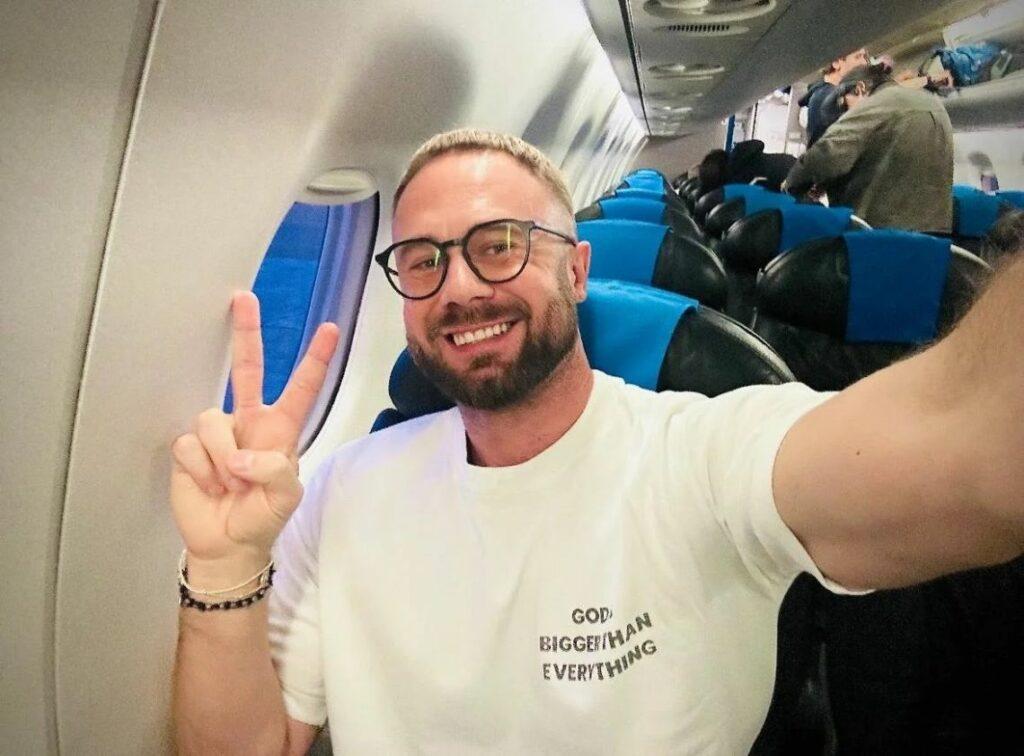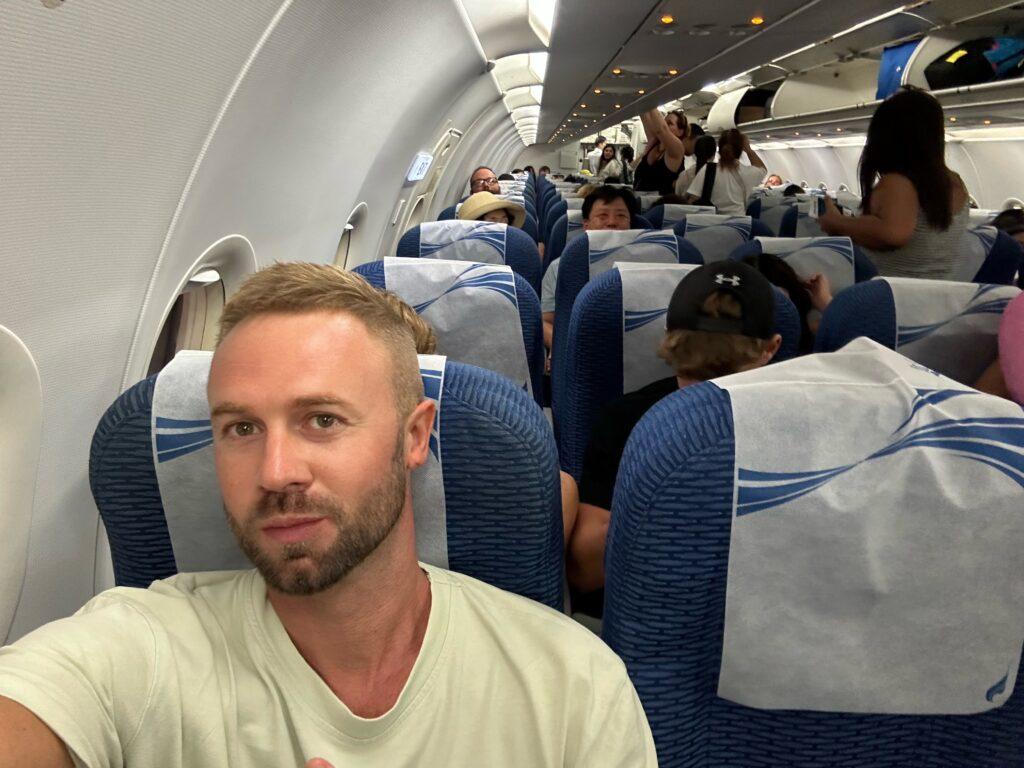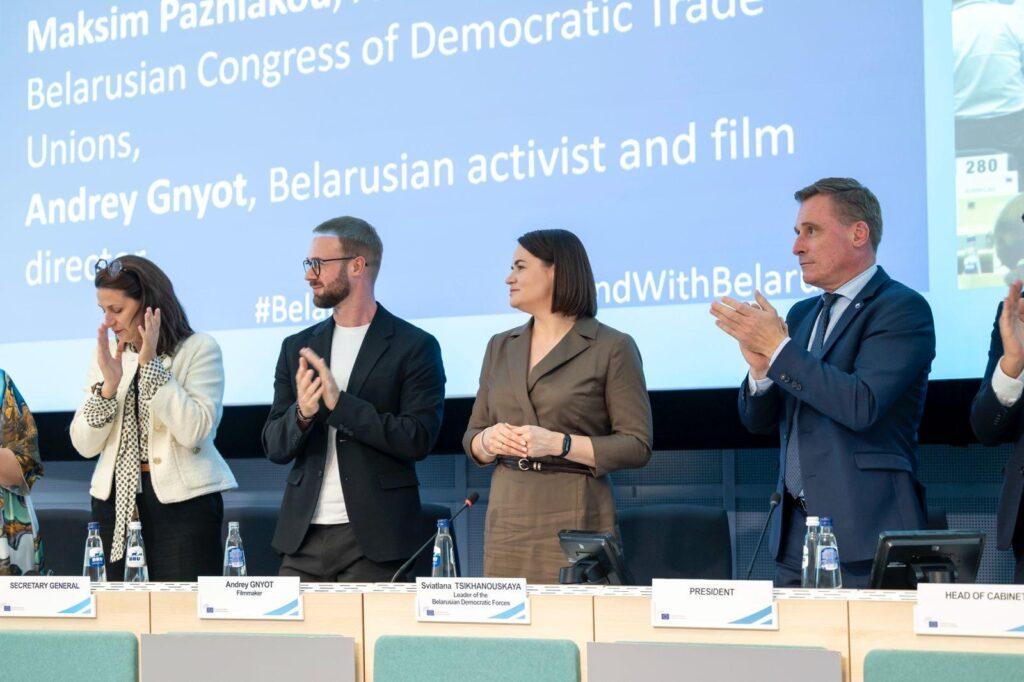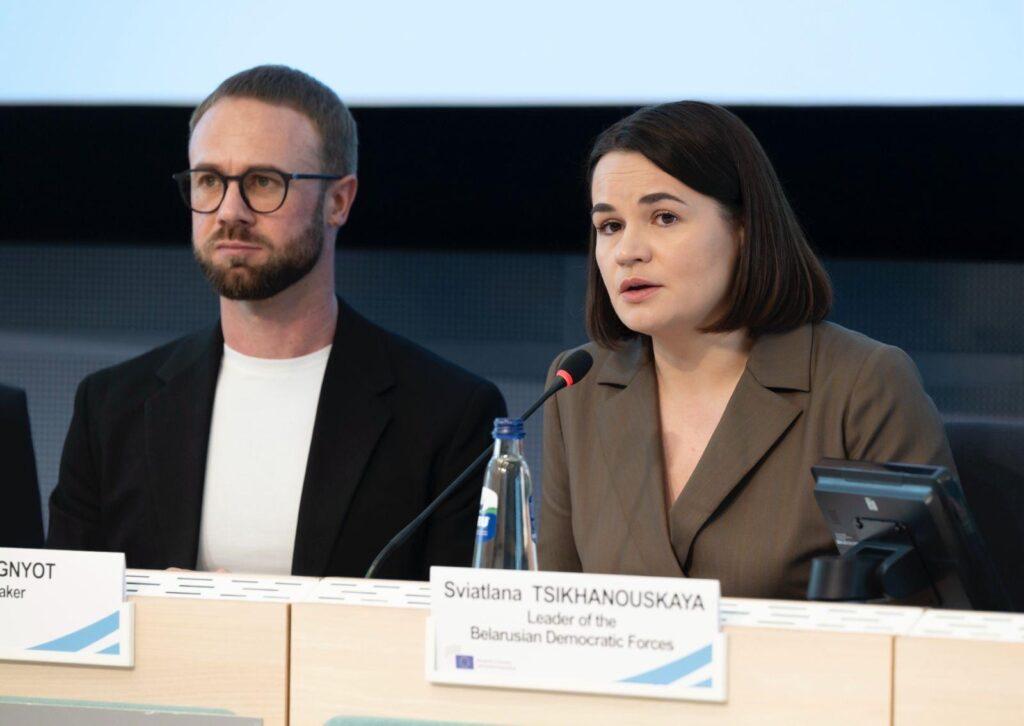Released, but not free: challenges after prison
The Belarusian director Andrey Gnyot flew to Serbia for a film project — and eight hours later, he left the airport in handcuffs. It was the beginning of a months-long ordeal.

Kseniia Levadna
Public Relations Officer

We meet Andrey Gnyot at the Libereco office in Berlin. Only two months have passed since his long-awaited release. The Belarusian activist, journalist, and filmmaker is also one of the leading voices of the Free Association of Belarusian Athletes (SOS BY). In 2020, he extensively reported on the protests in Belarus, brought athletes together, and advocated for democratic values.
In October 2023, he was arrested in Belgrade and spent a year in detention — seven months in a Serbian prison, followed by five months under house arrest. Now, back in freedom, he begins to rebuild his life and faces new challenges.
This article sheds light on how time in prison changes one’s life, what sources of strength help endure difficult times, and the obstacles former political prisoners have to face after their release.
Life in prison: from adjustment to resistance
Andrey Gnyot recalls that his arrest began with a total shock. “I came to Serbia as a director for a project — and eight hours later, I left the airport in handcuffs,” he says. The emotions at that moment were not surprising: fear, confusion, and disbelief.
During the seven months he spent in a Serbian prison, Andrey went through three phases — experiences that, in his opinion, every prisoner goes through. “The first phase is adjustment, which lasts about three months. At first, you live in constant fear, but at some point, you realize you can’t change anything. You adapt to the circumstances.”
The second phase is a crossroads: Some try to preserve their inner strength through discipline, while others give up and lose the will to live. “In prison, these people are called ‘the surrendered.’ They neglect themselves, fail to maintain a routine and eat poorly. They lose the strength to resist.”
The third phase is the struggle against the monotonous yet exhausting prison routine. “Three years is a critical limit. After that, many return, not because they’ve committed a crime again, but because life in freedom seems too complicated. They return to a system where everything is decided for them.”
Andrey recalls a conversation with an older fellow prisoner: “He was 65. He told me he liked it there — he had friends to talk to and no worries, especially in winter when people outside have to pay heating costs. For him, prison was a ‘safe harbor.’ However, one thing was clear: I had to adapt but could never get used to it. I didn’t want prison to become part of my real life.”
The hardest thing for Andrey was the total disempowerment — even in the most minor things: “You can’t shower whenever you want. Sometimes, I was lucky and caught a moment in warm water, but I couldn’t relax even then. As soon as I had lathered up, the order came: ‘Shop!’ I had one minute to get dressed and leave. Anyone too slow stayed without food for a week.”
Besides the physical restrictions, prison also meant emotional isolation: “You can’t show emotions because any wrong move or an unthoughtful glance can be seen as aggression or disrespect. This can quickly lead to conflict — and conflicts rarely end well in prison.”
The environment he was in was particularly challenging: “My cellmates were all professional criminals. Their conversations were only about crimes, and their talks felt like something out of gangster films. Despite overcoming the language barrier — with a mix of Serbian, Russian, Belarusian, and English — we couldn’t find any common ground. Their world revolved around crime; mine was entirely different. The only things we could talk about were sleep and food.”
This experience, says Andrey, made one thing clear to him: True freedom means making even the simplest decisions.
Photos from Andrey’s personal archive.







House Arrest
After prison, Andrey found himself under house arrest, which at first seemed like the better alternative. “I was relieved to finally be alone,” he recalls his first impressions. Life in prison was unbearable — constantly under pressure, the feeling of never being able to breathe. But in reality, house arrest was the opposite of freedom.
“You are still in a box, just in a different format. It’s like life is on pause,” says Andrey. House arrest restrictions do not give him the feeling of regaining lost freedom. Even at home, he felt constantly under control. “You can’t breathe easily, always on guard. At any moment, the police could show up at the door, and checks could happen without warning.”
He remembers how even his lawyers started showing up unannounced, taking away his last bit of control over his life. Eventually, he asked for appointments with lawyers and others to be communicated in advance. “I just wanted to regain at least a small piece of normality,” says Andrey.
He understands that a normal life is not possible under these conditions. The loss of personal freedom and control gradually leads to the loss of even one’s sense of self.
After Prison: A New Reality
After his release, Andrey found himself in a state of uncertainty and confusion, a feeling that still accompanies him today. “I wasn’t afraid, and that feeling hasn’t returned. But the fear was always there,” he describes his emotions. Everything around him seemed foreign and unfamiliar, even the people. For him, freedom wasn’t something to rejoice about. It was not a return to the world he once knew but rather an immersion into a new, strange reality.
Even everyday things like taking the subway were difficult for him. “I was used to seeing only familiar faces — yes, murderers, thieves, drug dealers — but I knew what to expect from each one,” he explains. Despite his sociable nature, Andrey finds it hard to adjust to normal life again. He now always seeks out the most remote and quiet corners in public transport or public places. After two months, he only notices minor improvements.
“Yesterday, I made huge progress, and I almost feel ashamed to say that,” confesses Andrey. “For the first time after all this time, I could shower after training at the gym. For most people, that’s completely normal, but for me, it was a small victory.”
What he would do after his release was an even more significant challenge. “I didn’t expect that freedom would not only bring happiness but also a huge burden,” says Andrey. After his release, he found himself in Berlin without clear plans for the future and no family nearby. Eventually, he realized that freedom was no longer what he had known. The adjustment process became a huge struggle: several moves between apartments and hotels and uncertainty about accommodation. “I didn’t know that there were such housing problems in Berlin. I should have prepared for that,” he admits. Time passed, and the feeling of emptiness grew stronger.
Andrey begins to realize that he needs to restore his mental balance in order to live a normal life. “I can’t afford to get back into a situation of uncertainty and stress,” he says, recognizing that he needs to live in a comfortable environment for a fulfilling life.
No less pressing was his financial situation. A year of isolation had depleted not only his family’s savings but also the donations. Andrey cannot work for two reasons: on one hand, he is officially not allowed to work, and on the other, his mind is not ready for it. “I caught myself thinking, ‘How nice would it be to be under house arrest again’… Yes, prison is a horrible place, but at least there, everything seemed easier,” he admits, recognizing that many former prisoners have similar feelings.
At the moment, Andrey wants to focus on his recovery before he is ready to take on new projects. “If I had a practical profession, I would already be working,” he says, explaining that his work requires creative thinking and intellectual effort. The emptiness he feels inside makes it impossible for him to be productive.

